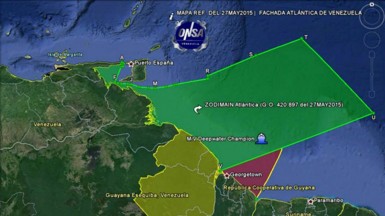The Ministry of Foreign Affairs has denounced a recent decree by Venezuela purporting to annex maritime zones belonging to Guyana, calling it a “flagrant violation” of international law.
In its first official statement on the decree, which was made last month by President Nicolas Maduro, the Ministry of Foreign Affairs also said yesterday that any attempt by Venezuela to apply that instrument in an extra-territorial manner will be “vigorously” resisted.
It “is a flagrant violation of international law and is inconsistent with the principle that all States should respect the sovereignty and territorial integrity of other states, large and small,” it declared.

Guyana “rejects this illegality which seeks to undermine our efforts at development through the exploitation of our natural resources offshore,” it added, while noting that Guyana will continue undeterred to access and develop its resources in line with the principles of international law.
Over the weekend, reports out of Caracas adverted to the decree, which had apparently been gazetted in Venezuela since May 27, 2015. Questions have been raised over the motives behind the decree and observers point out that it comes just after US oil firm ExxonMobil announced what could be the first major oil find in Guyana’s waters. Maps issued by Caracas show the ExxonMobil well site within the zone now being claimed.
Minister of Foreign Affairs Carl Greenidge on Saturday had indicated that Venezuelan Ambassador to Guyana, Reina Margarita Arratia Diaz would be summoned to give an explanation yesterday. It is not clear whether this was done.
Writing on his blog on Saturday, Guyana’s ambassador to Kuwait Dr Odeen Ishmael, who served as Guyana’s ambassador to Venezuela from 2003 to 2011, said the Maduro decree created the “Atlantic coast of Venezuela,” which would include sovereignty over Guyana’s territorial waters in the Atlantic Ocean off the Essequibo region.
A map, issued to coincide with this decree, indicates that Venezuela is now claiming all the territorial waters within the 200 miles range and blocking Guyana’s access to its resources in this area of the Atlantic Ocean, he observed.
“By this decree, the Venezuela government has also created the so-called “Areas of Integral Defense of Marine Zones and Islands,” thus ratifying its maritime sovereignty over the waters of the parts of the Caribbean and off the coast of Guyana. In doing so, it now claims sovereignty over the continental shelf and a projection of the Atlantic Ocean off the Essequibo region of Guyana, and even stretching into part of Suriname’s maritime space,” Ishmael wrote.
‘Aggressive and illegal’
According to the Foreign Affairs Ministry, the decree cannot be applicable to any part of Guyana’s territory and it said it intends to spare no effort to bring Venezuela’s “aggressive and illegal” action to the attention of the international community. Observers have suggested that Guyana could move to have an emergency meeting of Caricom to discuss the latest development and seek to raise the matter at the United Nations and the Organisation of American States.
In addition to disregarding international law, the statement said Guyana is concerned that the decree presents a threat to regional peace and security and breaches the Geneva Agreement of 1966.
The decree poses the first major foreign policy challenge for the new APNU+AFC government and its Foreign Minister and comes at a time when the administration is still to secure appointments of new envoys to Western capitals and Caracas.
In October, 2013, in Guyana’s waters, Venezuela intercepted the vessel Teknik Perdana, which had been doing work for US oil explorer Anadarko Petroleum Corporation. Since then, Caracas has avoided bilateral meetings with Georgetown to settle that matter and exploration in that area near to Venezuelan waters has ground to a halt. The demarche against ExxonMobil has escalated Caracas’ interference in Guyana’s search for oil and follows several warning letters to ExxonMobil by Venezuelan Foreign Minister Delcy Rodriguez when the oil exploration rig arrived in Guyana’s waters in March of this year.
Under the late Venezuelan President Hugo Chavez, Caracas had tamped down its traditional policy of interfering in investments in the Essequibo and off its coast. Since his passing in 2013, his successor, Nicolas Maduro has presided over rising attempts to interfere with investments and restate the claim to Guyana’s Essequibo, which was settled by international arbitration in 1899. Analysts have suggested that the aggressive acts are in part meant for the domestic Venezuelan audience where Maduro faces serious economic and political challenges.
Venezuela’s aggressiveness in Guyana’s waters against US explorers also comes amid continuing tension with Washington.





